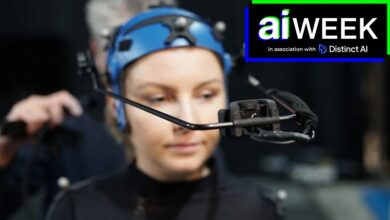Generative AI
Unleashing The Power Of Generative AI In Clinical Trials

Clinical trials are undergoing a transformative shift, driven by the impressive capabilities of generative AI (GenAI) technology. At the heart of GenAI’s impact lies its ability to democratize AI use.
Unlike traditional AI systems that require extensive coding expertise, GenAI empowers anyone with an internet connection to harness its power. This democratization enables broader technology acceleration, allowing researchers, clinicians and stakeholders across the healthcare spectrum to leverage GenAI’s capabilities seamlessly. These advances are poised to revolutionize the industry’s approach to drug development, patient care and medical advancements, ushering in a new era of efficiency, personalization, and accelerated progress.
Optimizing Trial Strategy Generation
One of the most important applications of GenAI in clinical trials is its capacity to rapidly generate trial strategies. By analyzing vast data from multiple sources, GenAI can process information in mere seconds, simulating different scenarios and surfacing the most promising and effective approaches. Users can provide inputs such as indication, phase, therapeutic area, desired timeline and cost thresholds, and GenAI will automatically evaluate scenarios to recommend the optimal approach, complete with guidance on countries, sites and recruitment timelines.
The beauty of this process lies in its iterative nature. Users can review the draft strategy, provide feedback and request revisions until they are satisfied. GenAI will then regenerate an updated strategy based on that feedback, typically within seconds or minutes. This automation is key to GenAI’s speed advantage, freeing up substantial time and resources that were once consumed by immense human effort.
Improved Documentation Creation
Another area where GenAI shines is automated document generation. From drafting clinical trial protocols and reports to generating templates for publications and correspondence, GenAI streamlines these processes, significantly reducing the time and effort required. Moreover, GenAI can review and analyze massive amounts of data instantaneously, ensuring sensitive information, such as medical records, is anonymized and patient privacy is preserved.
Greater Value from Data
GenAI’s ability to create value from unstructured data is particularly valuable in the context of clinical trials. Patient recruitment and standard-of-care practices can vary greatly across countries due to diverse patient populations and regulatory requirements. GenAI can process this unstructured information, helping researchers understand the nuances and intricacies of each country’s regulations, submission processes and validation procedures.
Furthermore, GenAI can assist in addressing practical challenges that arise during clinical trials. For instance, if certain medications require specialized storage conditions, GenAI can process unstructured data sources to identify which hospitals have the necessary equipment, ensuring smooth and compliant trial execution.
Study sponsor oversight is another area where GenAI’s data capabilities can make a significant impact. By analyzing vast amounts of documentation such as protocols, deviation reports and site data, GenAI can detect patterns and potential risks and predict outcomes based on simulations. Conversational AI and GenAI facilitate seamless communication and real-time monitoring between sponsors and study teams, enabling prompt feedback and course corrections, ensuring protocol adherence and promoting high-quality standards.
Augmenting the Human Element
Intelligent human augmentation is a key aspect of GenAI’s integration into clinical trials. Traditionally, trial monitoring requires experts to interpret complex dashboards and charts. With GenAI, even non-experts can ask questions in natural language and receive straightforward answers, enhancing data understanding and transparency. This “human-in-the-loop” concept ensures proper checks and human oversight over the AI system, while also empowering stakeholders with expanded insights and ad-hoc query capabilities.
What’s more, GenAI drives clinical trial efficiency and patient-centricity through optimized patient recruitment and personalized trial designs. By analyzing data, these technologies can identify ideal patient populations or subgroups, enabling precision matching of participants to suitable trials, and vice versa. This accelerates recruitment, reduces timelines and costs and enhances communication and accessibility for diverse stakeholders.
Explainability is Vital
The concept of “explainability” is paramount in building trust and confidence in the solutions proposed by GenAI. By providing clear explanations and justifications for its recommendations, citing evidence from analyzed data, GenAI maintains transparency and enables comprehension of the decision-making process. This alignment with scientific standards and ethical principles is crucial for the reliable and trustworthy use of AI in critical clinical trial applications.
Considerations for your GenAI Path
While the benefits of GenAI in clinical trials are manifold, it is essential to address the potential risk of “hallucinations” – situations where GenAI generates solutions or answers that do not have a factual basis or contain information that does not exist.
To mitigate this risk, robust testing and verification processes must be implemented, cross-checking AI recommendations against factual evidence and documented cases.
Final Thoughts
The integration of GenAI strategies enhances clinical research processes, enabling more efficient, accurate and patient-centric trials. AI introduces transformative speed, cost-efficiencies and quality improvements across the trial lifecycle, accelerating drug development timelines and increasing R&D productivity.
Automation enabled by GenAI condenses data preparation, scenario modeling and recruitment planning from days to minutes, freeing up significant time and resources.
For stakeholders, AI centralizes data, automates repetitive tasks, enables user-friendly access and offers robust regulatory oversight. It benefits sponsors through automated processes and real-time tracking, site staff through instant query resolution and risk identification, regulators through comprehensive quality data and, crucially, patients through personalized designs and improved outcomes.
Overall, GenAI holistically enhances clinical trial efficiency, speed, quality and patient-centricity from design through analysis. Implementing AI augments standard processes, enabling faster drug discovery, improved diagnostics, personalized medicine and remote patient monitoring. All these factors support delivering the right drugs and therapies to the right patients faster, fundamentally reshaping healthcare.
Unlike traditional AI systems that require extensive coding expertise, GenAI empowers anyone with an internet connection to harness its power. This democratization enables broader technology acceleration, allowing researchers, clinicians and stakeholders across the healthcare spectrum to leverage GenAI’s capabilities seamlessly. These advances are poised to revolutionize the industry’s approach to drug development, patient care and medical advancements, ushering in a new era of efficiency, personalization, and accelerated progress.
Optimizing Trial Strategy Generation
One of the most important applications of GenAI in clinical trials is its capacity to rapidly generate trial strategies. By analyzing vast data from multiple sources, GenAI can process information in mere seconds, simulating different scenarios and surfacing the most promising and effective approaches. Users can provide inputs such as indication, phase, therapeutic area, desired timeline and cost thresholds, and GenAI will automatically evaluate scenarios to recommend the optimal approach, complete with guidance on countries, sites and recruitment timelines.
The beauty of this process lies in its iterative nature. Users can review the draft strategy, provide feedback and request revisions until they are satisfied. GenAI will then regenerate an updated strategy based on that feedback, typically within seconds or minutes. This automation is key to GenAI’s speed advantage, freeing up substantial time and resources that were once consumed by immense human effort.
Improved Documentation Creation
Another area where GenAI shines is automated document generation. From drafting clinical trial protocols and reports to generating templates for publications and correspondence, GenAI streamlines these processes, significantly reducing the time and effort required. Moreover, GenAI can review and analyze massive amounts of data instantaneously, ensuring sensitive information, such as medical records, is anonymized and patient privacy is preserved.
Greater Value from Data
GenAI’s ability to create value from unstructured data is particularly valuable in the context of clinical trials. Patient recruitment and standard-of-care practices can vary greatly across countries due to diverse patient populations and regulatory requirements. GenAI can process this unstructured information, helping researchers understand the nuances and intricacies of each country’s regulations, submission processes and validation procedures.
Furthermore, GenAI can assist in addressing practical challenges that arise during clinical trials. For instance, if certain medications require specialized storage conditions, GenAI can process unstructured data sources to identify which hospitals have the necessary equipment, ensuring smooth and compliant trial execution.
Study sponsor oversight is another area where GenAI’s data capabilities can make a significant impact. By analyzing vast amounts of documentation such as protocols, deviation reports and site data, GenAI can detect patterns and potential risks and predict outcomes based on simulations. Conversational AI and GenAI facilitate seamless communication and real-time monitoring between sponsors and study teams, enabling prompt feedback and course corrections, ensuring protocol adherence and promoting high-quality standards.
Augmenting the Human Element
Intelligent human augmentation is a key aspect of GenAI’s integration into clinical trials. Traditionally, trial monitoring requires experts to interpret complex dashboards and charts. With GenAI, even non-experts can ask questions in natural language and receive straightforward answers, enhancing data understanding and transparency. This “human-in-the-loop” concept ensures proper checks and human oversight over the AI system, while also empowering stakeholders with expanded insights and ad-hoc query capabilities.
What’s more, GenAI drives clinical trial efficiency and patient-centricity through optimized patient recruitment and personalized trial designs. By analyzing data, these technologies can identify ideal patient populations or subgroups, enabling precision matching of participants to suitable trials, and vice versa. This accelerates recruitment, reduces timelines and costs and enhances communication and accessibility for diverse stakeholders.
Explainability is Vital
The concept of “explainability” is paramount in building trust and confidence in the solutions proposed by GenAI. By providing clear explanations and justifications for its recommendations, citing evidence from analyzed data, GenAI maintains transparency and enables comprehension of the decision-making process. This alignment with scientific standards and ethical principles is crucial for the reliable and trustworthy use of AI in critical clinical trial applications.
Considerations for your GenAI Path
While the benefits of GenAI in clinical trials are manifold, it is essential to address the potential risk of “hallucinations” – situations where GenAI generates solutions or answers that do not have a factual basis or contain information that does not exist.
To mitigate this risk, robust testing and verification processes must be implemented, cross-checking AI recommendations against factual evidence and documented cases.
Final Thoughts
The integration of GenAI strategies enhances clinical research processes, enabling more efficient, accurate and patient-centric trials. AI introduces transformative speed, cost-efficiencies and quality improvements across the trial lifecycle, accelerating drug development timelines and increasing R&D productivity.
Automation enabled by GenAI condenses data preparation, scenario modeling and recruitment planning from days to minutes, freeing up significant time and resources.
For stakeholders, AI centralizes data, automates repetitive tasks, enables user-friendly access and offers robust regulatory oversight. It benefits sponsors through automated processes and real-time tracking, site staff through instant query resolution and risk identification, regulators through comprehensive quality data and, crucially, patients through personalized designs and improved outcomes.
Overall, GenAI holistically enhances clinical trial efficiency, speed, quality and patient-centricity from design through analysis. Implementing AI augments standard processes, enabling faster drug discovery, improved diagnostics, personalized medicine and remote patient monitoring. All these factors support delivering the right drugs and therapies to the right patients faster, fundamentally reshaping healthcare.
Wing Lon Ng has over 20 years of experience in data science and machine learning. As a trained statistician and econometrician, with a PhD in Economics, he has a strong background in applied data science in academia and industry, with over 50 research articles published in international journals and conferences. Wing Lon currently leads IQVIA’s ACOE MLE team as the Director of AI Engineering, specializing in clinical trial strategy planning and automation.



